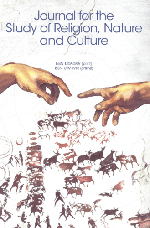After Earth? Religion and Technology on a Changing Planet
2023 ISSRNC Conference | Call for Papers
February 2-5, 2023 @ Arizona State University and Beyond
Human-induced changes to the Earth system are happening at an unprecedented rate. At the same time that human activity is disrupting the climate, igniting mega-fires, depleting natural resources, and triggering mass extinctions, we are witnessing renewed interest in space exploration and extra-bodily aspirations. Religion and spirituality, in myriad forms, are present in calls to restore nature and respect natural limits, as well as in excitement about transgressing traditional earthly boundaries and creating new futures. Pressing global-scale environmental and social problems are increasingly met with technological responses that can foster greater intimacy and entanglement with nature, but also detachment from nature and material processes.
Hyperconnectivity and alienation simultaneously define our social lives and interactions with nature. Can the same technologies that potentially enable humans to decouple from Earth be deployed to save it? Can emerging technologies be a vehicle for positive change or religious transformation? How, if at all, do techno-solutions address the underlying cultural, social, and religious causes of global crises? Do emerging technologies fundamentally alter the human-nature relationship, or are they merely the latest version of longstanding religious or secular-scientific interpretations of the human? Is there an implied theological anthropology embedded in techno-social and techno-environmental projects? How do technologies at the horizons of planetary limits—from space exploration to renewable energy—intersect with matters of race, gender, and justice? Does a global-scale response to these interconnected, escalating crises demand a shared, common vision of the human?
We welcome proposals from scholars across the arts and humanities, sciences and social sciences, inviting all researchers broadly engaged with the nexus of religion, nature, and culture. The conference theme of “Religion and Technology on a Changing Planet” is a direct invitation to those scholars working on the following:
- Religious and spiritual aspects of emerging technologies, including rewilding, virtual reality, artificial intelligence, space exploration, etc.;
- Theological and ethical critiques of emerging technologies including climate engineering, de-extinction, synthetic biology, space exploration (e.g. settlement, empire, extraction, colonization, terraforming);
- Inquiries into the intersection of religion, gender, sexuality, and embodiment with the construction of scientific and technological forms of knowledge;
- Religious and spiritual dimensions of planetary models (Gaia, Earth System Science, Spaceship Earth, cybernetics, animism, autopoiesis and ecopoiesis);
- Compatibility or conflict of emerging technologies with environmental justice, Indigenous rights and perspectives, religious/ethical perspectives on animals or nature;
- Engagement of religious and spiritual groups with post-truth technologies (social media, misinformation, science denial, conspiracy);
- Futurevisions and worldmaking, religion in/and/of science fiction, dystopia, utopia, apocalypticism, Afro-futurism, Afro-pessimism, religion and ethics in promised, unrealized, and emerging human and non-human futures;
- Machine intelligence, AI, and transhumanism; sapient technologies, techno-transcendence, religious, spiritual and ethical dimensions of human augmentation and organic-synthetic fusions, technologically facilitated spiritual experiences; cybernetics, disability, queerness;
- Intersections of religion and spirituality with extractivism, disposability, necropolitics, and ‘throw-away culture’; the theology and ethics of energy transition; climate change belief and denial in a digitally mediated political economy;
- We also invite reflection on theory and method in the study of religion and the environment; barriers to interdisciplinary inquiry; and/or discussion of methods and practices for engaging across disciplines.
Format:
The 2023 ISSRNC Conference will employ a hybrid format. Assuming that coronavirus protocols allow it, our primary modality will be an in-person gathering at the Tempe campus of Arizona State University. Remote participation will be possible, especially for presenters who pre-arrange their virtual participation and for presenters from the Global South whose participation will be enabled by remote technologies. Our hybrid format will also include “satellite” locations, which will facilitate in-person participation for smaller groups who wish to limit their carbon emissions by gathering at a site nearer to home. Satellite locations and details for these regional gatherings will be announced soon.
Proposal Submission and Deadlines:
We invite proposals from all researchers working at the nexus of religion, nature, and culture.
Proposals may take the form of individual papers or pre-arranged panel sessions. Individual paper proposals must include two documents: The first should be a 150-word abstract that includes the Title, as well as the name and contact information of the Participant. The second should be a 500-word (or less) description of the paper that includes the Title, and indicates the methods, argument, and findings as well as the relevant literature engaged. Session proposals should include a 150-word abstract for the entire panel that includes the Panel Title and contact information of the Participants and a 500-word (or less) description of each individual paper, including Paper Title, methods, argument, and findings.
Proposals for sessions or events that would not fit the traditional session format are also encouraged. For instance, we invite proposals for an experimental online session that would enable ISSRNC members to present at the conference without physically attending. This session would consist of pre-recorded video presentations that would be available to all conference participants. The presenters would be expected to participate in an asynchronous online discussion of the presentation throughout the conference. We also plan to reserve space for a number of panels developed through new or existing ISSRNC online working groups.
Please use the submission form provided here to submit your proposal by September 30, 2022 extended to October 9, 2022 due to Hurricane Ian. Papers will be anonymously peer-reviewed by an international scholarly committee and decisions made by late October 2022. All presenters will be required to join or renew as members in good standing of the International Society for the Study of Religion, Nature and Culture. Presenters and session organizers are encouraged to submit their articles for publication, or their sessions for special issues, to the official publication of the ISSRNC, the Journal for the Study of Religion, Nature, and Culture (JSRNC).









